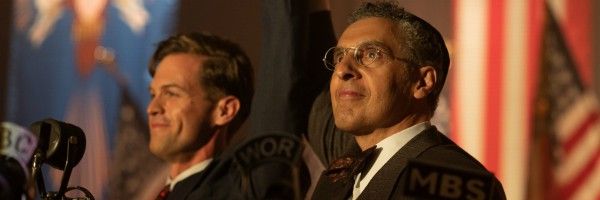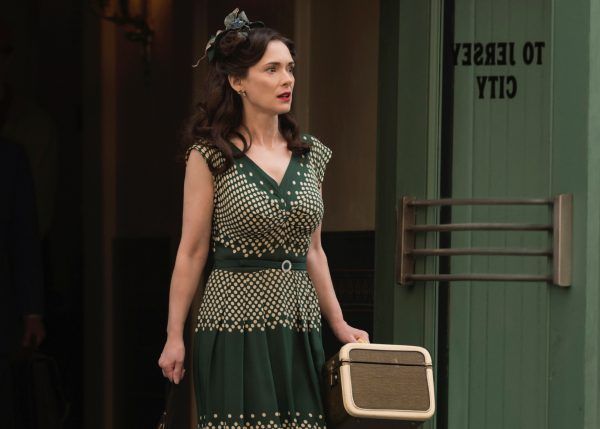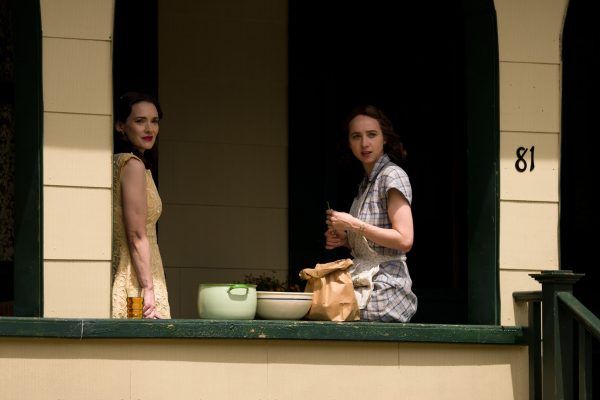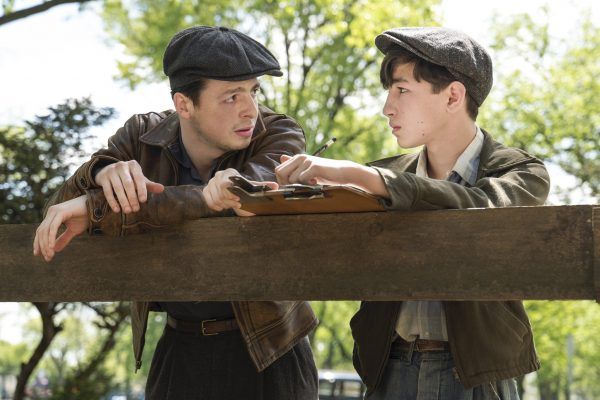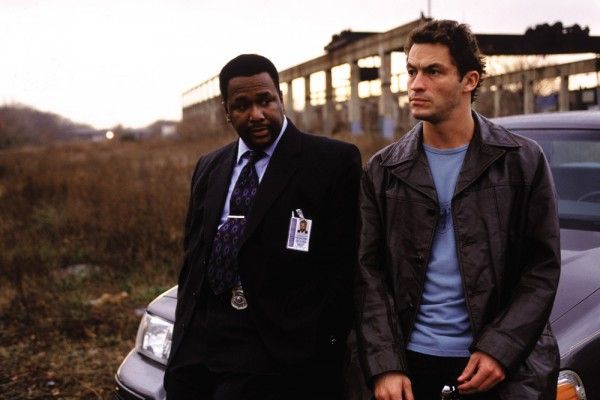Created by David Simon and Ed Burns and based on the novel by Philip Roth, the six-part HBO limited series The Plot Against America follows a working-class Jewish family in New Jersey through an alternate American history during World War II, when aviator hero and xenophobic populist Charles Lindbergh has won the presidency and is taking the nation ever closer to fascism. As opposing political views threaten to tear families apart, the eerie parallels of how an outsider can stoke the flames of anti-Semitism and xenophobia from the highest leadership position in the nation become frighteningly real. The limited series stars Zoe Kazan, Morgan Spector, Winona Ryder, John Turturro, Anthony Boyle, Azhy Robertson, and Caleb Malis.
During this 1-on-1 phone interview with Collider, executive producer David Simon talked about the complicated history in getting The Plot Against America to the screen, why he ultimately decided that this was a story that needed to be told, his nearly 20-year history with HBO, how he approached the storytelling for the mini-series, the feeling he wants to leave audiences with when they watch it, and the impeccable casting in his work. He also talked about whether he’d always envisioned The Deuce as a three-season series, how he feels about the format that people watch The Wire in, developing multiple possible upcoming projects, and how he approaches his own TV viewing.
Collider: Aside from the fact that it’s beautiful to look at, I was truly fascinated by the story that you’re telling with this. Was this a novel that you came across and read on your own, and thought it would make an interesting TV project, or did someone bring the idea of making it into a TV project to you?
DAVID SIMON: It’s a complicated history. I read it when it came out, in about 2004, and I thought it was a fascinating departure for [Philip] Roth. Obviously, it’s an alt-history, inspired by his family of origin. It was a little bit of a departure from what he normally does, but that was all. I was involved in making television, but I wasn’t adapting novels, or anything. So, I didn’t think about the book until 2013, when a fellow named Tim Rothman, who’s from Baltimore and I think used to run Sony, called me about making it a mini-series. This was right after Obama had been inaugurated for the second time. He argued that it should be a mini-series and that it had some prescience to American life. And to me, it just felt like an artifact, with the country moving in a more inclusive direction and we were less susceptible to fears of the other. I just didn’t see it. It didn’t feel like the political moment we were in, in 2013.
Fast forward to 2016, and I had re-read the novel at his insistence in 2013, so it was fresh in my head, and I was at lunch with the HBO execs. They were talking about the election and what anybody should try to make that could speak to the political moment, and I brought up the book because I’d read it three years earlier. I wasn’t even talking about myself. I said, “Whoever’s got the option on it, you should cut a deal and get that made.” I had other things that I was pitching to them, but we talked about that. They seemed a little ambivalent, at the time. There were a lot of dystopian narratives that were hitting television, at the time, and they may have felt like they missed the window. There was The Man in the High Castle and The Handmaid’s Tale. So, I don’t think I made much headway at that lunch, but one thing they said was, “I think Joe Roth has the option. He came in here and he pitched it to us, but I don’t know that we’re buying.”
So, when I got back to Baltimore, I asked my assistant to get Joe Roth on the phone, and she did, and I said, “You were right, three years ago, when you tried to get me to do this. You were prescient, and I was not, because this novel is really our political moment.” I just kept talking, and finally he interrupted and said, “This is the first time I’ve ever talked to you. What are you talking about, three years ago?” I said, “You called me about this. You had the option. You said we should make this, back in 2013.” He said, “I’ve never talked to you before, in my life.” And I said, ‘Aren’t you the guy that used to run a studio?” He goes, “Yeah, I used to run Warner Bros.” That’s when he realized and said, “Are you talking about Tim Rothman?” So, I got the wrong guy, and I hung up the phone. All I wanted to tell him was, “I spoke well of you. You should maybe call the HBO guys to reconsider.” I wasn’t even trying to get in on the project. Anyway, I hung up the phone with Joe Roth, thinking that I’d just made an ass of myself and mistook him for somebody else. But he called back, 20 minutes later, and said, “Do you wanna write this? Do you wanna go into HBO and do this together?” So, that’s how I got involved. That’s the honest truth, how this book got made.
Image via HBODid you have any apprehension about telling this story, once you decided to do it, or are from that moment, where you all in?
SIMON: I was all in. If you read the novel, it’s an incredibly astute parlor drama, in which you experienced an American dry run at fascism, from within the lives of a vulnerable cohort. And for 1940, that cohort would have been and was American Jewry. Jewish Americans, suddenly, were having their loyalties questioned and their politics questioned. They were being made by some in the political sphere to feel as if they were less than other Americans. That was the rhetoric of the moment, of isolationism and of Lindbergh and of America first, which is where that phrase originated. That’s not the case.
The reason to do the book now is not to re-legislate or re-argue 1940. I think the verdict is in Lindbergh and isolationism, and whether or not Hitler could be regarded as a neutral party or an ally, in any event. History has spoken, so there’s no point in re-legislating or re-arguing that. The reason to do it, obviously, is that we’re in the same moment now, but the vulnerable cohorts are people of black and brown skin and Muslims. They are being used as the feared other to drive a nationalism and a latent racism and anti-Semitism. In our current moment, Jewish Americans are not the most vulnerable cohort, although anti-Semitism is on the rise because it always is when intolerance has its day. That train is never late. But the people who are genuinely vulnerable to human rights abuses are people who are black and brown and Muslim. You’re seeing it from the Southern border and you saw it in the airports, immediately after the inauguration, you see it in the demonization of this current culture of immigration. That’s as American as apple pie. That goes back to the Know Nothings in the 1840s. So, what you’re seeing is the same thing that Roth depicted, brought forward. Once you read the book, a mini-series seems inevitable.
You have a great relationship with HBO. How much do they still want to know every little detail, and how much is it a case of, after everything you’ve done, they’re a bit more hands off with you?
SIMON: It’s never quite hands off. I would say it’s fair that they trust us to put the dollars on the screen. We very rarely go over budget. If we do, it’s usually an act of God. It’s not something where it’s a failure of planning. It’s often something that couldn’t be helped. The vast majority of time, we stay on budget, so they can trust that we’re not gonna get lost in production. They generally have good notes, when they have notes, or they’ll ask questions that they can be reassured upon because you can explain what you intend, visually, or you can explain what’s gonna happen, three scripts down the road. We’ve done a lot of work together. We’re coming up on 150 hours of television, so it’s about 20 years of work. But I have to tell you that nobody I started with at HBO is still there. I’m now senior, in years, to everybody who I’m working for, except maybe Len Amato. In terms of working with me, he was not in mini-series or series. Everybody that I started working with, in 1999, is gone. There are always new people who come into a project and they’re nervous, and they wanna make sure you know what you’re doing and that you’re doing due diligence on your casting choices, your locations and your budgetary responsibilities, and that’s their job. On this project, we had a lot of new people, and now they’re not new people anymore.
Have you ever had a strong disagreement with anyone there, over a plot point or anything, especially within the last decade?
SIMON: Not a strong disagreement. An academic disagreement. Yeah, sure, we’ve argued over some things. I can’t think of any. There was no place where we were about to collapse under the weight of that disagreement. Argument makes it better. And their notes are generally smart. They’re not frightened notes. They don’t give notes that are politically frightened of the material. They’re usually about executing better.
With something like this, where you’re telling a six-part story, do you plan it out and write it as one story, and then figure out the best way to chop it into six parts, once it’s done, or do you think about it as six individual episodes and decide good places to pause the story, for each of those episodes?
SIMON: More the former. First, you think about it as a whole, and then you start thinking about whether it’s six, seven, five or eight parts and what we need to tell the story. You start looking at the book and at what you need to accomplish, with the all of the characters. Obviously, we had to go beyond the book, in some respects, because the book is written from the point of view of a 10-year-old kid, who’s now older and looking back on his childhood, and that’s a very convoluted structure for a mini-series with all of these issues. So, we needed to expand the point of view to about six characters. We had to think first about, structurally, how we were gonna tell the story. And then, once you do that, you think about how you’re gonna serve these characters. Is it over six, seven or eight parts? So, you start figuring out how much time you need. And then, you start seeing where you would divide the story, episodically.
You’ve previously talked about how you felt that ending needed to be a bit different. Was there a specific feeling that you wanted to leave audiences with, at the end of this?
SIMON: That, as citizens, this is our moment. This is our historical pivot. What happens in the next year or two is gonna affect the future of our Republic, if our Republic does, indeed, have a future. It’s that critical. Democracy and freedom, and the freedom that democracy provides, are never entirely won. It’s a daily struggle. Every day, you have to kill a few snakes, and if you stop killing snakes, and you stop demanding your own freedom and your own civil liberties, they disappear. This generation of the electorate is now being challenged, in ways that previous generations were also challenged. How we behave, in how we vote, whether we have the capacity to resist, and what we’re willing to tolerate and not tolerate, are essential questions. So, I wanted those questions in the air, after you watch this piece, and I hope they are.
Your casting is always excellent. Do you do a lot of auditioning, or do you just think about who would be good in certain roles? What led you, specifically, to Zoe Kazan and Winona Ryder, for this?
SIMON: I’d worked with Winona on Show Me A Hero, and I worked with her at the point at which she was very much ready to cast off the America’s ingenue mantle and start acting some hard adult roles. And she has the chops to do it, she really does. I didn’t know how good she was and how much she had come into this moment, where she could now take on different roles, until I worked with her. That was a little bit of, “I know you’re a good actor. I’ve seen you carry films. I think you could do this part where you’re a hardened political realist, who’s a council woman in Yonkers, New York. And I think it’ll be a really interesting turn.” But I didn’t know how good she was until she showed up, and how serious she was about capturing every moment and putting herself in the world. After that, the idea of Evelyn came up, and it just seems perfect for her. She was a student of Roth. I think she met him, at some point, but she’s read all of Roth. She’s read all of everything. She’s an autodidact. So, she understood the part, she understood the book, and she’s very political. She was also willing to go to Netflix and make sure they would make room, so that she could do this project because she’s under contract with them (for Stranger Things).
And Zoe, we had worked with on The Deuce. That was a part that didn’t have a lot of legs to it, in terms of story. She was playing the ex-wife, but there were some key scenes that helped explain the dynamic, and she was magnificent in them. She had an arc that didn’t go to full flower because of the way the story was arrayed, so I felt like there was a secret weapon in there and that she was ready to drive a show. And yeah, when you put the two of them together, they just feel like sisters. And Morgan [Spector’s] dynamic between the two of them is just grand. I believe the whole family, with the kids. So, in answer to your question, sometimes you know the people you’re asking to work with you and you know what they can do. Sometimes you’re hoping they’ll read ‘cause you’re not sure, and sometimes they will, but sometimes they won’t.
And a lot of it, I have to credit Alexa Fogel, who been casting our shows, ever since The Wire. I don’t think anyone’s done any better, and I can’t imagine anybody being as close to our sensibilities as Alexa is. For example, she pulled Anthony Boyle off of Broadway and said, “I think this guy could be your Alvin.” And he came in from Belfast, Northern Ireland to play the angry Jewish kid, and he just nailed it.
Had you always envisioned The Deuce to run for three seasons, and is that a show where you had any storyline changes, along the way, or did it always follow the arc that you thought about, from the beginning?
SIMON: There are always changes, and you’re always adjusting for character, and for the colors that actors are showing you, and certain dynamics, and you’re always learning more, as you do more research. But the general construct of the rise of Times Square and the culture of pornography, and that moment where pornography seemed to be predominant, in Midtown Manhattan, but also was moving towards people’s living rooms, as a very ordinary part of American life and a very ordinary product, was the second piece. And then, third piece was what happens to the obsolescence of the actual physical plant and the people who were the pioneers, while the product, itself, goes on to conquer the world. That three-act play, George [Pelecanos] and I came up with that and we pretty much held to that.
When it comes to something like The Wire, do you prefer that people who have never watched the show watch it the way it was originally shot, or in HD, and why?
SIMON: I don’t care. We shot it in such a way that if they ever wanted to widen the screen our composition would not be brutalized too badly. Obviously, the directors knew what they were shooting, and (executive producer) Bob Colesberry knew what he wanted the directors to shoot, when we were not in letterbox. That is the original attendant. If you want the original intent, you’ll watch it without the letterbox. But Bob Colesberry had a feeling that, down the road, somebody was gonna want to put out a letterbox version. It was not my decision, but he was aware that we were shooting film in such a way that we weren’t going to just be changing the box. We actually had extra film on the edges. He protected it for that. So, as far as transfers to letterbox go, it’s not a bad version.
Do you have any idea what you’re going to do next? Is there already a subject or some source material that you’ve been thinking about?
SIMON: It’s not worth talking about because, honestly, we’re developing five separate things. The company is working on five different projects, and we don’t know when the scripts are gonna be ready and we’re gonna be satisfied that we’ve executed them well, and then whether it’s going to find favor, with HBO or anyone else. So, until you get a green light, it’s not even worth talking about because then you’re teasing the audience and you might not be able to deliver.
You’ve certainly created and given us some excellent television, over the years. What do you like to watch? Are there current shows that you think are telling great stories?
SIMON: I’m sure there are. I tend to consume more half-hour than hour because when you’re working on dramas, you don’t wanna have other dramas seeping in. You wanna give everybody a little bit of wide birth. I’ll watch stuff after it’s not on the air. I saw The Sopranos after they finished their run, and loved it. I saw Deadwood after it finished its run. I’m a great fan of Slings and Arrows, this Canadian show about a Shakespearian repertory company, which I thought did three magnificent seasons. I wish they’d done more. I spend my time watching Brockmire and loving it. I love Hank Azaria, and I love Amanda Peet. So, I tend to watch the stuff where I’m never gonna be in the same milieu, so that I can safely watch it and just enjoy it.
But I don’t watch a lot of stuff when it comes out. I wanna know that they know how to write the ending, before they write the beginning, so I’ll wait until somebody says that the show was great, they did four seasons and knew where they were going and really executed it. Then, I’ll pick it up and run with it. For example, I didn’t watch The Man in the High Castle or The Handmaid’s Tale, while we were developing this show, even though those shows were out and about, doing their business. Now that I’m done, I certainly can, and if I get the time, I will. But there was a consciousness of, “No, let me just go about working on Roth’s novel and not have other dystopian visions in my head.” I don’t wanna step on anybody, and I wouldn’t want them stepping on me. It’s better this way.
The Plot Against America premieres on HBO on March 16th.

